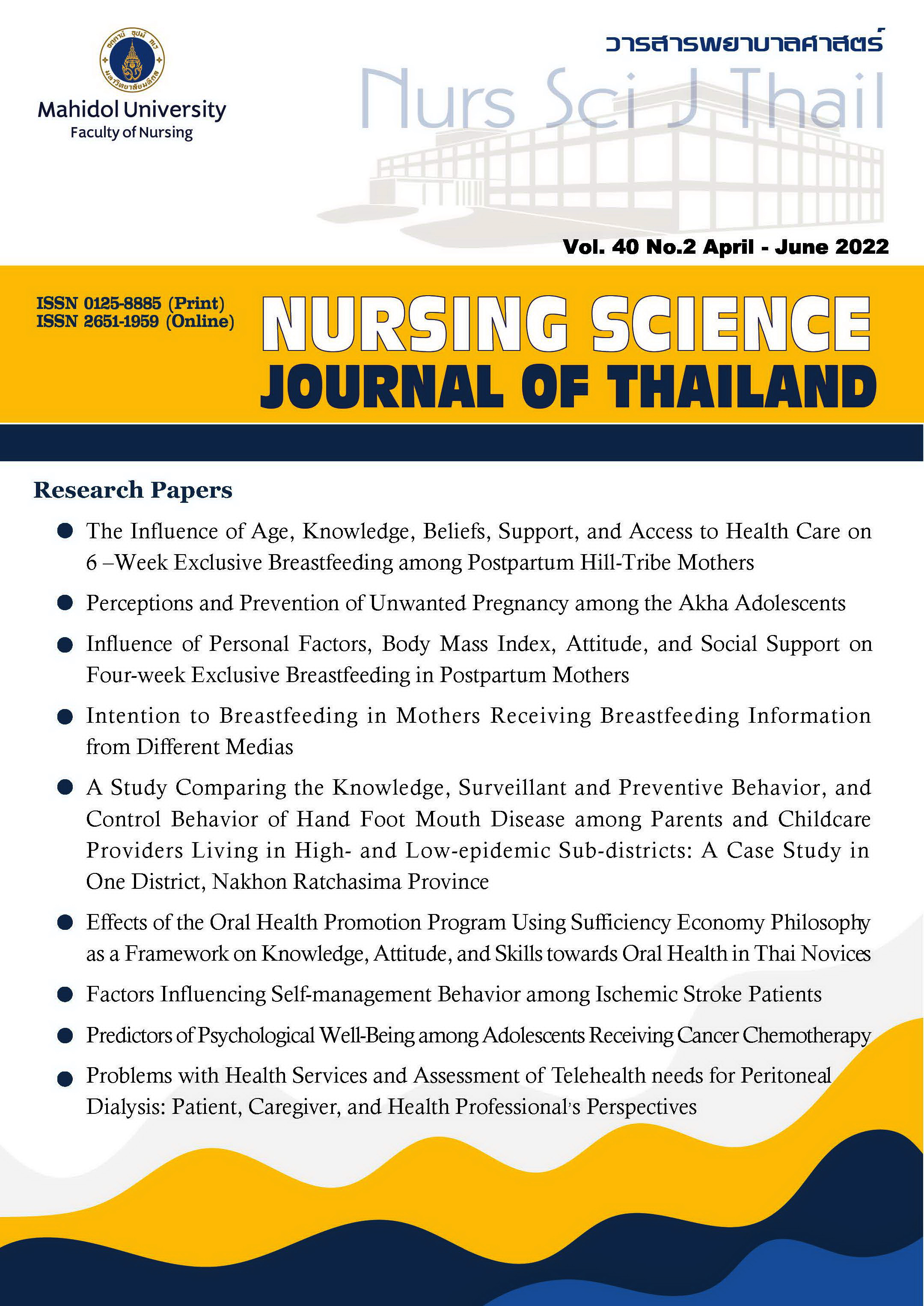Intention to Breastfeeding in Mothers Receiving Breastfeeding Information from Different Medias
Main Article Content
Abstract
Purpose: To compare the maternal intention to exclusive breastfeeding and continued breastfeeding among mothers receiving three different types of breastfeeding media: personal media, personal media along with specialized media, and personal media along with the internet link.
Design: Quasi-experimental design.
Methods: The study samples were postpartum mothers in the obstetric ward a university hospital, Bangkok. There were 75 people divided into 3 groups. Data were collected from July to October, 2018. The research instruments consisted of 3 types of media which were personal media, specific media and internet link. Tools used for data collection included two interviewing questionnaires asking about 1) mother’s and infant’s general information, and 2) their opinion towards breastfeeding information obtained and their intention to exclusive and continued breastfeeding. The data were analyzed using descriptive statistics and Kruskal Wallis test by ranks.
Main findings: The study showed that intention to exclusive breastfeeding (p < .05) and intention to continued breastfeeding (p < .05) were significantly different among three groups of mothers: receiving personal media only, receiving personal media along with specific media, and receiving personal media along with the internet link. For post hoc comparison, the mothers receiving personal media along with specific media and mothers receiving personal media along with the internet link had longer duration of intention to exclusive breastfeeding and intention to continued breastfeeding than the mothers receiving the personal media only.
Conclusion and recommendations: According to the study findings, the mothers receiving personal media along with either specific media or the internet link showed their intention with longer duration to exclusive breastfeeding and continued breastfeeding than the mothers receiving personal media only. Therefore, nurses should apply multimodal implementation of breastfeeding education for mothers by integrating specific media, like booklet, and internet platform in the routine advice given by nurses. Several sources of information given will facilitate mothers to obtain at hand information which would enhance their intention to breastfeed longer.
Article Details

This work is licensed under a Creative Commons Attribution-NonCommercial-NoDerivatives 4.0 International License.
Copyright Notice: Nursing Science Journal of Thailand has exclusive rights to publish and distribute the manuscript and all contents therein. Without the journal’s permission, the dissemination of the manuscript in another journal or online, and the reproduction of the manuscript for non-educational purpose are prohibited.

Disclaimer: The opinion expressed and figures provided in this journal, NSJT, are the sole responsibility of the authors. The editorial board bears no responsibility in this regard.
References
Jedrychowski W, Perera F, Jankowski J, Butscher M, Mroz E, Flak E, et al. Effect of exclusive breastfeeding on the development of children's cognitive function in the Krakow prospective birth cohort study. Eur J Pediatr. 2012;171(1):151-8. doi: 10.1007/s00431-011-1507-5.
World Health Organization. Breastfeeding [Internet]. Geneva: WHO; 2017 [cited 2018 May 30]. Available from: http://www.who.int/topics/breastfeeding/en/
Ajzen I. The theory of planned behavior. Organ Behav Hum Decis Process. 1991;50(2):179-211. doi: 10.1016/0749-5978(91)90020-T.
National Statistical Office of Thailand. Project for the survey of the situation of children and women in Thailand 2019, key summary report [Internet]. Bangkok: National Statistical Office; 2020 [cited 2021 Mar 15] Available from: http://www.nso.go.th/sites/2014/DocLib13/ด้านสังคม/สาขาประชากร/สถานการณ์เด็กและสตรี/2562/MICS6_report_071063.pdf. (in Thai).
Apartsakun P. Discouraging factors of breastfeeding among Thai women. Journal of Public Health Nursing. 2016;30(2):133-46. (in Thai).
Wichianchai W, Limprapaipong T, Saowaros C. Factors influencing intention to exclusive breastfeeding for 6 months after giving birth of pregnant women attending antenatal care of Phra-Pok-Klao Hospital. Journal of Phrapokklao Nursing College. 2006;18(1):1-13. (in Thai).
Nakcharoen S. Communication patterns in public relations projects to promote breastfeeding [master’ thesis]. Bangkok: Chulalongkorn University; 2006. 195 p. (in Thai).
Chinnawon A. Public relations media. Bangkok: Chulalongkorn University Press; 2010. 373 p. (in Thai).
Sasombat P. Communication process of “Nommea Group” breastfeeding. Journal of Communication Arts. 2007;25(2):41-62. (in Thai).
Satawethin P. Mass communication: processes and theory. 3rd ed. Bangkok: Parbpim Printing; 2003. 280 p. (in Thai).
Hmone MP, Li M, Agho K, Alam A, Dibley MJ. Factors associated with intention to exclusive breastfeed in central women's hospital, Yangon, Myanmar. Int Breastfeed J. 2017;12:29. doi: 10.1186/s13006-017-0120-2.
Nguyen PH, Kim SS, Nguyen TT, Hajeebhoy N, Tran LM, Alayon S, et al. Exposure to mass media and interpersonal counseling has additive effects on exclusive breastfeeding and its psychosocial determinants among Vietnamese mothers. Matern Child Nutr. 2016;12(4):713-25. doi: 10.1111/mcn.12330.
Somanusorn M. The obstetrics nursing, volume 2. 12th ed. Nonthaburi: Yutharin Printing; 2015. 213 p. (in Thai).
Polit DF, Beck CT. Nursing research: generating and assessing evidence for nursing practice. 9th ed. Philadelphia: Lippincott Williams & Wilkins; 2012. 802 p.
Jirawatanakul A. Statistics for health science research. Bangkok: S Asia Place; 2015. 313 p. (in Thai).
Payakkaraung S, Sangperm P, Samart C. Breastfeeding problem in early postpartum period: mother’s experiences. Nursing Science Journal of Thailand. 2016;34(3):30-40. (in Thai).
Sitthichaiyuk W. Factors affecting determination to purchase dietary supplement products of undergraduate student at Burapha University, Chonburi Province [dissertation]. Chonburi: Burapha University; 2016. 143 p. (in Thai).


